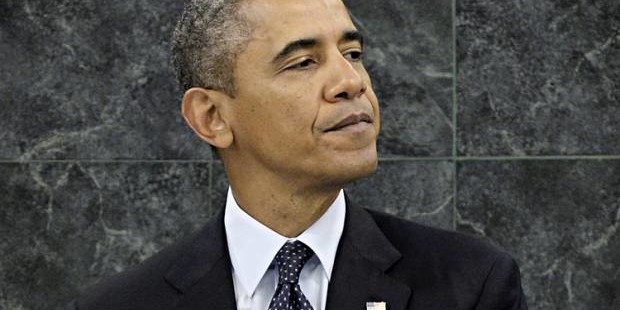
Stand up and fight, Mr. President!
The moment requires courage, conviction — and presidential leadership. How will President Obama respond?
Remarkable doings at the U.N. this week. Remember these days. They are going to change the way we understand the dynamic in the Middle East — what is possible and what not.
General Assemblies ordinarily do no more than clog traffic on Manhattan’s East Side and fill tables at pricey French restos. This one, No. 68, is turning out differently. Something is happening at this session, which runs into next week — something small now but destined to grow large, in my view.
But we have to start with what did not happen.
Everyone was aflutter before the GA opened, given that President Obama would be milling around the same diplomatic lounges as Iran’s new reformist president, Hassan Rouhani. They were going to address the same heads of state, taking up the same topic: Can Washington and Tehran get beyond three and a half decades of enmity and advance toward a cooperative relationship? People fixated on the thought of a handshake. Nixon and Mao. Kissinger and Lê Đức Thọ. Begin and Arafat. Obama and Rouhani.
There was no handshake. Muted groans all around.
It matters not. The only interesting thing about the missing handshake was how Washington played it. Obama was ready; the ayatollah was just not up to it: This was the drift, faithfully conveyed by our media, which went, profoundly, from a fixation on the handshake to a fixation on the no-handshake. It is nonsense. Rouhani has his adversaries at home, plainly. But the man is out there in the political pit taking on the beast, and this is just as plain. Obama is the one tiptoeing past the political risk — less courageously, you have to say.
Obama’s courage, indeed, will be much at issue in coming weeks. He took the wise choice at the General Assembly — he opened the door to Rouhani’s invitation to negotiate past differences on Iran’s nuclear program, Syria, Israel and much else. Is he committed to it? Does he share the vision Rouhani articulates as to all that can come — all over the Middle East — from a renovated relationship?
It is hard to say, and one worries. Obama will require more guts than now seems evident if he is going to get this done. And his opener at the U.N. was less than promising. “The roadblocks may prove to be too great,” he said in reply to Rouhani’s demarche, “but I firmly believe the diplomatic path must be tested.” It is not much by way of compelling beliefs, fair to say. (Memo to speechwriters: It is upside down, reeking of diffidence. Do it this way next time: “Let us mount the diplomatic path and tamp it firm by treading it. Let us push aside what roadblocks may lie ahead.”)
The GA is not over yet, and the best may be yet to come. Israeli Prime Minister Benjamin Netanyahu stayed home this week, snubbing (rudely, as he does things) the Obama and Rouhani speeches (and instructing the Israeli delegation in New York to avoid Rouhani’s). He is due to address the assembly next Tuesday, having just journeyed to Washington for a face-to-face in the Oval Office. These are the next big moments. They will test Obama’s commitment and, let’s say, chutzpah. They will afford a glimpse as to how — with wisdom or violence — the Middle East can advance beyond its incessant state of crisis. It does not get much bigger.
This brings us to the significance of GA No. 68. The equation laid bare in New York this week is this: Washington needs to reimagine its policies in the Middle East, Iran being a self-evident example. This will require an adjustment in U.S. policy toward Israel. This is the core reality. The question is whether leadership finds this adjustment politically and diplomatically possible. If it does, Washington can respond at last to an awakening Middle East. If it does not, relations with Israel will set the limits of America’s capacity to recast its ties in a region demanding it do so.
This is what Rouhani carried to New York in his suitcase. Stripping this choice to its pith is the task he came to accomplish. It is why Netanyahu refuses to listen to him. It is what causes those simpering sounds emitting from the White House. The past (known) is often preferred to the future (unknown). Enemies proposing friendship can be more frightening than enemies. These are Rouhani’s challenges — I suspect, just as he intended them.
These days are so filled with event on the foreign relations side that we have a brief time to consider preference and probability, one next to the other.
You are reading a columnist with a vigorous preference for a new path forward in the Middle East. Three reasons:
• We and the Middle East need it. Americans love their technological innovations, but iGadgets are not true innovations — changes in the way we think and do things and understand others. We do not get much innovation done on the foreign relations side, for instance. This would be authentic innovation, but there is little to none so far as I can make out. Look at Egypt. We had a duly elected government and could manage nothing more than a reversion to support for military cruelty. Even Obama, at the U.N., acknowledged “the hostility that our engagement in the region has engendered throughout the Muslim world.” All you have to do is think of why this hostility arises. It is not a given. We earned it and can earn our way out of it.

